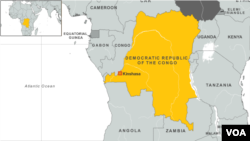Hundreds of civilians have been killed in northern territories of the Democratic Republic of the Congo's Katanga province since armed groups from the ethnic Batwa, or pygmy, and Luba communities launched attacks on one another two years ago, the United Nations reports.
Dozens of villages have been burned to the ground, and tens of thousands of people have been displaced.
Human Rights Watch recently interviewed survivors of one of the worst attacks, in which Luba fighters killed at least 30 pygmies with machetes, arrows and axes in April at Nyunzu. The organization has also spoken to Luba survivors of pygmy attacks.
In its report on the conflict, released Tuesday, Human Rights Watch called for DRC authorities, with U.N. support, to improve protection, investigate and prosecute those responsible for atrocities, and address the communal tensions and discrimination, which it said appeared to have sparked the fighting.
The report said tension between the two communities erupted in mid 2013, "after Batwa demanded respect for their basic rights, including access to land and an end to alleged forced labor or a form of slavery."
Spokesman Felix Basse of the U.N. mission in Congo, MONUSCO, told reporters Wednesday that "the conflict between the Luba and the pygmies is not recent. It is centuries old.” He said the two communities' co-existence has been troubled because of land disputes and claims to certain rights, and they have formed armed groups that clash repeatedly.
The HRW report said the government has primary responsibility for security in the area, but alleged that MONUSCO has had too few troops based at Nyunzu.
Basse rejected suggestions the mission has paid insufficient attention to the remote area. He said MONUSCO chief Martin Kobler had personally visited Nyunzu to investigate the social situation there, which he said was deteriorating by the day.
MONUSCO has deployed troops at Nyunzu several times, Basse added, including special forces and a temporary operational base to help restore calm, and that has been achieved.
The United Nations said most of the estimated 15,000 displaced people at Nyunzu have returned to their villages, although many of their homes have been destroyed and living conditions are extremely difficult.




